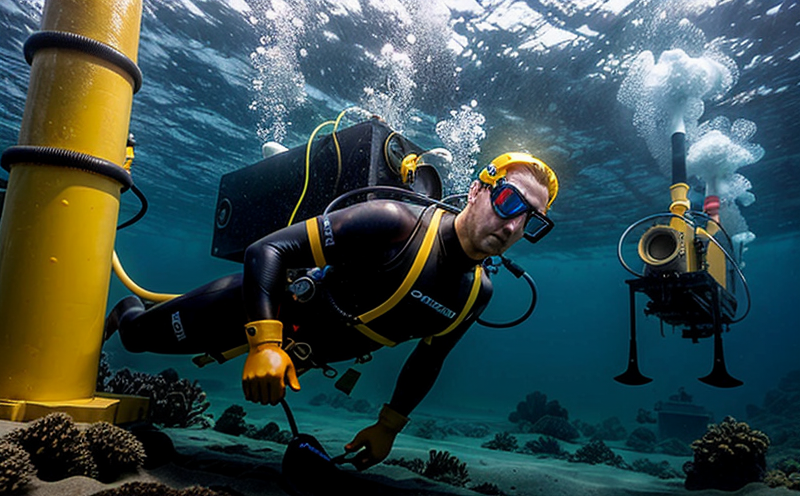ASTM G85 Modified Seawater Fog Testing of Subsea Components
The ASTM G85 Modified Seawater Fog Test is a critical procedure used in the marine and ship equipment testing sector to evaluate the corrosion resistance of subsea components. This test simulates the corrosive environment that subsea equipment might encounter, particularly focusing on the effects of seawater fog. The primary goal is to determine how well these components will withstand long-term exposure to this challenging environment without degrading.
Seawater contains various ions and minerals, including sodium chloride, which can cause significant corrosion in metal components when exposed to moisture. Fog testing specifically aims at replicating the conditions where subsea equipment might be exposed to moisture in a foggy environment, which is common near coastlines or during transit through harbors.
The test involves exposing specimens to a simulated seawater fog atmosphere for extended periods under controlled laboratory conditions. The apparatus used includes specialized chambers designed to mimic the environmental parameters found in marine settings, such as humidity and temperature levels. This ensures that the results are consistent and reliable for compliance purposes.
ASTM G85 specifies the procedures for conducting this test, including the preparation of specimens, exposure protocols, and methods for evaluating the presence or absence of corrosion. The test is particularly useful for manufacturers and quality managers who need to ensure their products meet regulatory standards set by international organizations like ISO, ASTM, EN, IEC, and other relevant bodies.
For R&D engineers involved in developing new subsea components, this testing ensures that they can design products capable of withstanding the harsh marine environment. Compliance officers also benefit from this test as it helps them ensure their equipment complies with all necessary standards and regulations before deployment at sea. Furthermore, procurement teams can rely on ASTM G85 results to make informed decisions about the quality of subsea components they source.
The ASTM G85 Modified Seawater Fog Test is essential for maintaining the integrity and longevity of subsea equipment, ensuring that it performs reliably in its intended environment. By adhering to this standard, manufacturers can enhance product durability and minimize maintenance costs over time.
Benefits
Evaluates the long-term corrosion resistance of subsea components under realistic marine conditions.
Ensures compliance with international standards such as ASTM G85, enhancing product quality and reliability.
Identifies potential weaknesses in design or material selection early in development cycles, allowing for timely corrections.
Reduces maintenance costs by ensuring components remain functional over extended periods without degradation.
Eurolab Advantages
At Eurolab, we offer comprehensive ASTM G85 Modified Seawater Fog Testing services tailored to meet the needs of our clients in the marine and ship equipment testing sector. Our state-of-the-art facilities provide precise control over environmental variables such as temperature, humidity, and exposure time.
We employ experienced technicians who are knowledgeable about both the theoretical aspects of ASTM G85 and practical implementation strategies. This ensures accurate and reliable test results every time. Additionally, our laboratory adheres strictly to ISO/IEC 17025 accreditation standards, guaranteeing quality assurance throughout the testing process.
Our services extend beyond just conducting tests; we also provide detailed reports that include comprehensive analysis of the test data. These reports help clients understand the implications of their products' performance under simulated marine conditions and suggest actionable steps to improve future designs if necessary.
Use Cases and Application Examples
The ASTM G85 Modified Seawater Fog Test is applicable in numerous scenarios within the subsea industry. One common use case involves testing newly developed pipelines for offshore oil rigs before deployment. Another example includes evaluating the durability of connectors used in deep-sea mining operations.
By using this test, manufacturers can ensure that their products meet stringent quality control criteria set by international standards organizations like ASTM. This not only enhances product reliability but also builds trust among end-users who rely on subsea equipment for critical tasks at sea.





